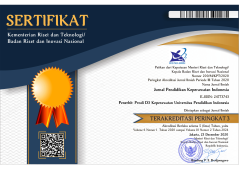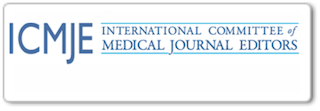Relationship between Self Care Behavior and Diabetes Self-Management Education in Patients with Diabetes Mellitus Type 2
Abstract
Type 2 Diabetes Mellitus is caused by disruption of insulin secretion and insulin resistance. One aspect that plays an important role in the management of this disease is diabetes self-management education. Good self-care behavior will make diabetes management controlled and prevent complications and make the quality of life better. The purpose of this study is to determine the relationship between self-care behavior and knowledge, patient motivation, family support, and self-efficacy on diabetes self-management education for type 2 Diabetes mellitus patients. The method used in this study was a quantitative approach: cross-sectional. The sample used was 115 patients with type 2 Diabetes mellitus in Sidrap Regency. The analytical method used is the Structural Equation Model (SEM). The findings of the study showed that self-care behavior in patients with diabetes mellitus type 2 was influenced by knowledge factors by 89%, motivation factors by 82.8%, family support by 84.9%, and self-efficacy factors by 78.4%. Meanwhile, diabetes management of type 2 Diabetes mellitus patients was influenced by treatment factors by 75.5%, blood sugar control factors by 88.1%, dietary factors by 60.9%, physical activity factors by 87.3%, and foot care factors by 53,8%. The structural model of this study explains the variable care cell behavior with self-care management of 47.5%, so it can be seen that self-care behavior has a significant effect on DMSE in type 2 Diabetes mellitus patients (p-value= 0.001). Therefore, the management of Diabetes mellitus must be more active in providing education to sufferers so that their knowledge or family members can increase and understand how to carry out diabetic management properly.
Keywords
References
American Diabetes Association. (2017). Classification and diagnosis of diabetes. Diabetes Care, 40 (1), 11–24. https://doi.org/10.2337/dc17-S005.
Bintoro, T., Putra, M. M., Made, N., & Yunica, D. (2019). Illness Perception , Motivation , And Self-Care Behavior In Diabetic Patients. In The 5th International Conference on Public Health. Solo, Indonesia: ICPH., February 13-14, 2019, 236-244 https://doi.org/doi.org/10.26911/theicph.2019.02.46
Hailu, F. B., Moen, A., & Hjortdahl, P. (2019). Diabetes self-management education (DSME) – Effect on knowledge, self-care behavior, and self-efficacy among type 2 diabetes patients in Ethiopia: A controlled clinical trial. Diabetes, Metabolic Syndrome and Obesity: Targets and Therapy, 12(4), 2489–2499. https://doi.org/10.2147/DMSO.S223123
Hidayah, M. (2019). The Relationship between Self-Management Behaviour and Blood Glucose Level in Diabetes mellitus Type 2 Patient in Pucang Sewu Health Center, Surabaya. Amerta Nutrition, 3(3), 176–182. https://doi.org/10.2473/amnt.v3i3.2019.176-182
Hsu, H. C., Lee, Y. J. and Wang, R. H. (2018). Influencing Pathways to Quality of Life and HbA1c in Patients With Diabetes: A Longitudinal Study That Inform Evidence-Based Practice. Worldviews on Evidence-Based Nursing, 15(2), 104–112. doi: 10.1111/wvn.12275.
Indradewi, D. P., Prihandhani, A. S., & Ngurah, A. K. (2019). Hubungan manajemen diabetes dengan kejadian luka kaki pada pasien diabetes melitus tipe 2. Journal Community of Publishing in Nursing, 8(1), 73–78. Retrieved from https://ojs.unud.ac.id/index.php/coping/article/view/59604/34611
Joyce, B., & Jane, H. (2014). Keperawatan Medikal Bedah: Manajemen Klinis untuk Hasil yang Diharapkan (8th ed.). Singapore: Elsevier (Singapore) Pte Ltd.
Karimi, F., Abedini, S., & Mohseni, S. (2017). Self-care behavior of type 2 Diabetes mellitus patients in Bandar Abbas in 2015. Electronic Physician, 9(11), 5863–5867. https://doi.org/10.19082/5863
Kemenkes. RI. (2018). Hasil Utama Riset Kesehatan Dasar Tahun 2018. Jakarta: Badan Penelitian dan Pengembangan Kesehatan.
Khan, M. A. B., Hashim, M. J., King, J. K., Govender, R. D., Mustafa, H., & Al Kaabi, J. (2020). Epidemiology of Type 2 Diabetes - Global Burden of Disease and Forecasted Trends. Journal of Epidemiology and Global Health, 10(1), 107–111. https://doi.org/10.2991/jegh.k.191028.001
McGowan, P. (2011). The efficacy of diabetes patient education and self-management education in type 2 diabetes. Canadian Journal of Diabetes, 35(1), 46–53. https://doi.org/10.1016/S1499-2671(11)51008-1
Mikhael, E. M., Hassali, M. A. and Hussain, S. A. (2020). Effectiveness of diabetes self-management educational programs for type 2 Diabetes mellitus patients in middle east countries: A systematic review. Diabetes, Metabolic Syndrome and Obesity: Targets and Therapy, 13(3), 117–138. doi: 10.2147/DMSO.S232958.
Mohebi, S., Parham, M., Sharifirad, G., & Gharlipour, Z. (2018). Relationship between perceived social support and self-care behavior in type 2 diabetics: A cross-sectional study. Journal of Education and Health Promotion, 7(48), 1–6. https://doi.org/10.4103/jehp.jehp
Mosleh, R. S. A., Jarrar, Y. B., Zyoud, S., & Morisky, D. E. (2017). Factors related to diabetes self-care management behaviors among patients with type II diabetes in Palestine. Journal of Applied Pharmaceutical Science, 7(12), 102–109. https://doi.org/10.7324/JAPS.2017.71214
Moura, N. D. S., Lopes, B. B., Teixeira, J. J. D., Oria, M. O. B., Vieira, N. F. C., & Guedes, M. V. C. (2019). Literacy in health and self-care in people with type 2 diabetes mellitus. Revista Brasileira de Enfermagem, 72(3), 700–706. https://doi.org/10.1590/0034-7167-2018-0291
Noviyanti, L. W., Suryanto, S. and Rahman, R. T. (2021). Peningkatan Perilaku Perawatan Diri Pasien melalui Diabetes Self Management Education and Support. Media Karya Kesehatan, 4(1), 67–77. Available at: https://journal.unpad.ac.id/mkk/article/view/30747.
Oluma, A. et al. (2020). Predictors of adherence to self-care behavior among patients with diabetes at public hospitals in West Ethiopia. Diabetes, Metabolic Syndrome and Obesity: Targets and Therapy, 13(1), 3277–3288. doi: 10.2147/DMSO.S266589.
Saeedi, P., Petersohn, I., Salpea, P., Malanda, B., Karuranga, S., Unwin, N., Williams, R. (2019). Global and regional diabetes prevalence estimates for 2019 and projections for 2030 and 2045: Results from the International Diabetes Federation Diabetes Atlas, 9th edition. Diabetes Research and Clinical Practice, 157, 107843. https://doi.org/10.1016/j.diabres.2019.107843
Salma, N., Fadli, F., & Fattah, A. H. (2020). Hubungan Kepatuhan Diet dengan Kadar Gula Darah Puasa pada Pasien Diabetes mellitus Tipe 2. Jurnal Media Keperawatan, 11(1), 102–107. https://doi.org/10.32382/jmk.v11i1.1512
Schmitt, A., Gahr, A., Hermanns, N., Kulzer, B., Huber, J., & Haak, T. (2013). The Diabetes Self-Management Questionnaire (DSMQ): development and evaluation of an instrument to assess diabetes self-care activities associated with glycaemic control. Journal Health and Quality of Life Outcomes, 11(138), 1–14. https://doi.org/10.1186/1477-7525-11-138
Shrivastava, S. R. B. L., Shrivastava, P. S., & Ramasamy, J. (2013). Role of self-care in management of diabetes mellitus. Journal of Diabetes and Metabolic Disorders, 12(14), 1–5. https://doi.org/10.1186/2251-6581-12-14
Shrivastva, A., Phadnis, S., Rao N, K., & Gore, M. (2020). A study on knowledge and self-care practices about Diabetes mellitus among patients with type 2 Diabetes mellitus attending selected tertiary healthcare facilities in coastal Karnataka. Clinical Epidemiology and Global Health, 8(3), 689–692. https://doi.org/10.1016/j.cegh.2020.01.003
Widyoga, R. C., Saichudin, & Andiana, O. (2020). Hubungan Tingkat Pengetahuan tentang Penyakit Diabetes Melitus pada Penderita terhadap Pengaturan Pola Makan dan Physical Activity. Journal Sport Science and Health, 2(2), 152–161. Retrieved from http://journal2.um.ac.id/index.php/jfik/article/view/11393
DOI: https://doi.org/10.17509/jpki.v8i1.45349
Refbacks
- There are currently no refbacks.
Jurnal Pendidikan Keperawatan Indonesia(JPKI) published by Indonesia University of Education. JPKI is licensed under a Creative Commons Attribution-ShareAlike 4.0 International License.
Office :
Nursing Department. FPOK UPI.
229, Dr. Setiabudhi Street. Bandung 40154
West Java , Indonesia
E-mail : jpki@upi.edu

_.png)
_.png)
_.png)











